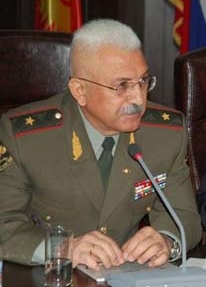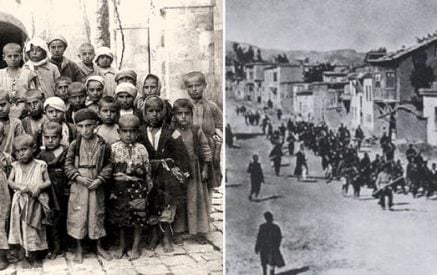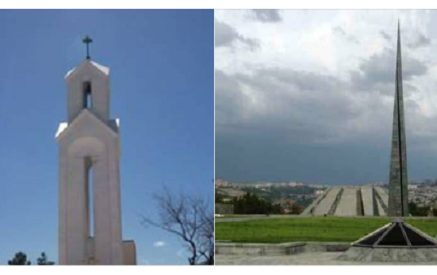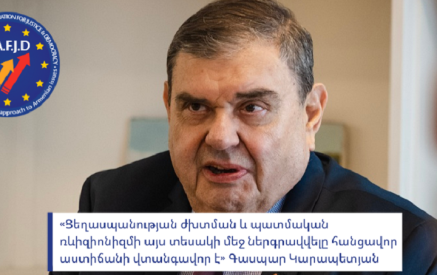Presentation of the Head of the Institute for National Strategic Studies MOD, RA, Doctor of Political Science, Major General Hayk Kotanjian.
Parliamentary hearings at the Standing Committee on Foreign Relations of the National Assembly of the Republic of Armenia, December 8, 2014.
Honorable Mr. Chairman!
Read also
Dear Members of the National Assembly of the Republic of Armenia and the European Jewish Parliament!
Ladies and Gentlemen!
Let me start my presentation highlighting the fact that tomorrow is the very day when 66 years ago – on December 9, 1948 – the United Nations adopted The Convention on the Prevention and Punishment of the Crime of Genocide[1] developed by Professor of Jewish origin Raphael Lemkin. At the same time, the proposal to legislatively announce the December 9 the Remembrance Day for victims of all Genocides in Armenia is on the agenda of the Standing Committee on Foreign Relations of the Parliament of the Republic of Armenia, under the auspices of which today’s hearings are conducted, that are very important in terms of understanding the perspectives of the security cooperation in the interest of the sustainable development of World Armenians and World Jewry.
Nevertheless, we must state, bearing the full responsibility, that on the eve of this significant event, in close proximity to the Republic of Armenia and the State of Israel the torturers of the Islamic State perpetrate genocide of Christians, Jews, Yazidis, and Muslims – not engaged in terroristic jihad. To efficiently solve the problem of countering this common threat, it is instrumental to consider and reconsider the lessons learned by peoples from the genocidal crimes committed against humanity and mankind during the contemporary history. At the same time, the absolute or proportionate number of victims from different peoples and religious groups is, indeed, various; nevertheless, this in no way belittles the role of tragedy in the fates of each of them.
The Armenian and Jewish peoples are alike in having responded to the genocides by restoring and democratically promoting their ancient statehoods. These remarkable events occurred at the end of the two World Wars of the 20th century: the Republic of Armenia and the State of Israel were established accordingly on 28 May, 1918 and 14 May, 1948.
The “Never Again” principle integrates the logical and moral bases of the Jewish and Armenian peoples’ right to contribute to the international community in providing Israel and Armenia with the guarantees of non-recurrence of genocide.[2] This principle is a cornerstone underlying the National Security Strategies of the Republic of Armenia and the State of Israel.
The urgency of the “Never Again” principle for the Armenian people called forth by the genocidal acts against the Armenians of Azerbaijan during Perestroika in the USSR, in response to the Nagorno-Karabakh Armenians’ peaceful political actions for self-determination and withdrawal from the Azerbaijani SSR in compliance with the USSR legislation then in force.[3] It concerns the pogroms in Sumgait and Kirovabad in 1988 and in Baku in 1990. These crimes were interspersed and to this day are being interspersed with the attempts to “counterbalance” them with the genocidal acts against Azerbaijanis allegedly committed by the Armenians. Thus, the slaughter of its own citizens in Khojalu, carried out in 1992 by the Popular Front of Azerbaijan – in order to discredit the then Azerbaijani President and to seize the power – is imputed to the Armenians who, when neutralizing enemy’s firing positions, had actually opened a humanitarian corridor for the evacuation of the people of Khojalu.[4]
In recent past, the Baku mass media played up the information that on the territory of the mass grave in Guba – a town in the north of Azerbaijan – a memorial complex was erected in commemoration of the victims of the genocide allegedly committed by the Armenians against the Mountain Jews at the beginning of the last century.[5] This fact became a matter of political manipulations targeted at cultivating anti-Armenian sentiments among the Jews.[6] However, as the historical facts picked up from the Turkish sources and published by the Armenian side evidence, in fact this concerns the mass grave of the Armenians killed as a result of the massacre perpetrated by the Ottoman Islamic army under the command of Nuri Pasha at the invasion of the South Caucasus in 1918. Besides, according to the documents of the Central State Historical Archive of Russia the relations between the Armenians and the Jews in the South Caucasus region were exceptionally friendly.[7] The attempts of using falsification of historical events in Guba – to lead the Jewish and Armenian peoples to a clash – failed due to the productive cooperation of the scholars and influential organizations of the Armenian and Jewish Diasporas, as well as the experts of Armenia and Israel.
In the case of the Jews, the urgency of guaranteeing non-recurrence of the Holocaust is conditioned by the unremitting mortal attacks against the Jewish people since the establishment of the State of Israel, and at present accompanied by the terrorism of the radical Islam. Direct intersection of security interests of the Armenians and Jews in terms of the threat of recurrence of genocides in the Middle East has recently been reflected in the destruction of the 1915 Armenian Genocide Martyrs’ Memorial Church of the Armenian Catholicosate of Cilicia in the Syrian desert Deir ez-Zor by the vandals of the Islamic State[8].
As it is well known, there is a serious issue regarding the fact that genocide – being an international crime against humanity and humankind – requires recognition from the state, the former authorities of which had committed genocide, as well as the international community. Meanwhile, non-recognition of genocide, as a rule, is politically motivated. As a precedent we should consider the recognition of the Holocaust by the authorities of the FRG, who have fundamentally dissociated themselves from Nazi Germany’s former genocidal leadership. As we know, the government of Konrad Adenauer on this basis signed an agreement with the government of Israel and the Conference on Jewish Material Claims against Germany, under which committed itself to pay compensation to the affected party. Distancing itself from the genocidal regimes of Sultan Abdul Hamid and the Young Turks with the assumption of adequate responsibility for compensating the damage is expected from modern Turkey’s authorities in terms of the Genocide committed against 1.5 million of its citizens of Armenian origin.
As some Israeli experts think, in due time, taking into account the dynamics of the Arab-Israeli conflict, Israel, with a view to build and maintain partnership with secular Turkey – an alternative to Arab states – has refused to recognize the Armenian Genocide, so as not to irritate Ankara. The public arguments of the given political solution were veiled in the form of protection of the uniqueness of the Holocaust as a phenomenon incomparable with any other genocide in the history of mankind.
However, along with the changing priorities of the Turkish authorities, based on the doctrine of “neo-Ottomanism”, and the consequent recent new geostrategy of Turkey in the Middle East and the Islamic world, there is a tendency for the recognition of the Armenian Genocide by authoritative representatives of the world Jewry. Let me provide you with some assessments by the leading researchers of the Holocaust.
- ISRAEL CHARNY,
Executive Director of the Institute on the Holocaust and Genocide, Jerusalem.
Editor-in-Chief of the Encyclopedia of Genocide.
“The Armenian Genocide is remarkable in many respects, including the fact that in the bloody 20th century it was an early example of mass genocide, which many recognize as a “dress rehearsal” of the Holocaust”[9].
SOL GITTLEMAN
Provost and Head of the Chair of Judaic Studies, Tufts University (US).
“The campaign of vilification and dehumanization which preceded the destruction of hundreds of thousands of Armenians in 1895-1896 and again in 1915 was, in subtlety and in preparation, just as carefully orchestrated as was the preparation of Dr. Goebbels. The Armenians were categorized according to the stereotype. Therefore, they were less than human, and killing men, women, and children was not an act of brutality, but rather an act of heroism necessary to free the country from an infection.”[10]
LUCY DAWIDOWICZ,
Expert on Holocaust, Harvard (US).
“The Armenian Genocide in its extent and horror most closely approximated the murder of the European Jews <…> The once unthinkable “Armenian solution” became, in our time achievable “Final solution”, the Nazi code name for the annihilation of the European Jews.[11]”
Meanwhile, Israel urged to recognize the Armenian Genocide not only by leading experts on the Holocaust. Over the years Knesset members Aryeh Eldad, Ze’ev Elkin, Zahava Gal-On, Haim Oron, Yossi Sarid, Yuri Stern, Yair Tzaban, Alexander Tzinker and others bore on the agenda of the plenary sessions of the Israeli Parliament proposals for official recognition of this tragic fact of history. Today’s Israeli president Reuven Rivlin – the then Speaker of the Knesset – also considered the recognition of the Armenian Genocide to be the duty of the Israeli parliament.[12]
A crucial support for the recognition of Armenian Genocide demonstrated Yona Metzger, Chief Rabbi of Israel, who visited the Memorial to the victims of the Armenian Genocide in Tsitsernakaberd in 2005[13].
We welcome the members of the European Jewish Parliament at the National Assembly of the Republic of Armenia on the threshold of the 100th Anniversary of the Armenian Genocide in the Ottoman Empire. Let me express my confidence that today’s joint discussion of ours will advance the understanding and implementation of constructive cooperation between the Armenians of the World and World Jewry in the interests of security and sustainable development of the Republic of Armenia and the State of Israel, as well as the Armenian and the Jewish Diasporas.
In conclusion, I feel genuinely obliged to speak about the appropriateness of the invitation of His Excellency the President of Israel Dear Mr. Reuven Rivlin to Yerevan in April, 2015, to take part in events marking the 100th Anniversary of the Armenian Genocide in the Ottoman Empire. This visit, reflecting the national security interests of the State of Israel and the Republic of Armenia, and I am sure of it, may become a high performance act of moral duty for all the states and peoples of the world – in relation to the memory of the victims of crimes against humanity and mankind.
…
[1] See Конвенция о предупреждении преступления геноцида и наказании за него. Принята резолюцией 260 (III) Генеральной Ассамблеи ООН от 9 декабря 1948 года (https://www.un.org/ru/documents/decl_conv/conventions/genocide.shtml),
H.V. hakobian: The Genocide of the Armenians in Azerbaijan from 1988-1990, from the standpoint of international law. “Haykakan Banak” Quarterly Journal of Military Sciences, MOD, RA, Yerevan 1997.
[2] See: Гайк Котанджян. “Никогда опять” – императив гарантирования безопасности еврейского и армянского народов. International expert Center for Electoral Systems. 31 мая 2011 (https://www.elections-ices.org/russian/publications/textid:10805/).
[3] See: Hayk Kotanjian: Minister of Foreign Affairs of the Nagorno-Karabakh Government In-Exile Speaks of the Twenty-Fifth Anniversary of the Karabakh National-Liberation Movement, International Center for Electoral Systems, Israel, https://www.elections-ices.org/files/publications/298.pdf.
[4] See: in detail В. А. Пономарев. Трагические события, которые можно было предотвратить. Военно-научный журнал ИНСИ МО РА “Армянская армия”, 2012, N 3.
[5] See: “Французские евреи испытали ужас от массового захоронения в Губе”. 27 октября 2012 АзерТАдж: – (https://news.day.az/politics/363021.html).
[6] See: Гайк Котанджян. Политологи против политики ксенофобии главы Азербайджанского государства. 01.11.2012 (https://www.elections-ices.org/files/publications/16038.pdf)
[7] See: “Почему и как Российские евреи принимали христианство по армянскому обряду (1910-1915 гг.)”. Документы и материалы Центрального Государственного Исторического Архива России. Подборка. Составитель и автор введения академик НАН РА Вардгес Микаелян, Ереван, “Наири” 1999.
[8] See “IS said to destroy Armenian Genocide memorial: Complex in Deir ez-Zor was often compared to the Auschwitz death camp in Poland”. September 22, 2014, The Times of Israel (https://www.timesofisrael.com/is-reportedly-destroys-armenian-genocide-memorial/#ixzz3L1iCdUis)
[9] Charny Israel. Ed., Introduction to «The Widening Circle of Genocide» – «Genocide: A Critical Bibliographic review». Vol. New Branswick, N.J.: Transaction, 1994. P. XIX; «The Ottoman Empire: A Troubled Legacy». Views, Comments and Judgements by Noted Experts Worldwide. Compiled by Vahakn N. Dadrian for the Association of Genocide Scholars. Williamsburg (USA), 1997. P. 69.
[10] Sol Gittleman, The Stereotype as a Prelude to Genocide in «Genocide and Human Rights» (A special issue of the «Journal of American Studies», IV, 1 & 2, 1992. P. 5); «The Ottoman Empire: A Troubled Legacy». Views, Comments and Judgements by Noted Experts Worldwide. Compiled by Vahakn N. Dadrian for the Association of Genocide Scholars. Williamsburg (USA), 1997. P. 75.
[11] Dawidowicz Lucy. The Holocaust and the Historians. Cambridge, MA: Harvard University Press, 1981. P. 20.
[12] “Knesset Speaker working to boost recognition of Armenian genocide”. May 31, 2011, Haaretz (https://www.haaretz.com/print-edition/news/knesset-speaker-working-to-boost-recognition-of-armenian-genocide-1.365034)
[13] “Israeli chief rabbi says killing of Armenians in 1915 was genocide”. November 23, 2005, World Jewish Congress (https://www.worldjewishcongress.org/en/news/5737/israeli_chief_rabbi_says_killing_of_armenians_in_1915_was_genocide)























































